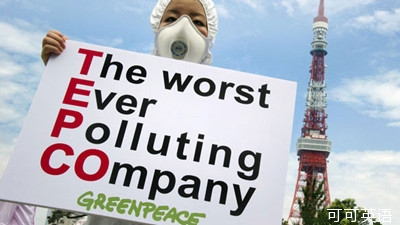Its shares have fallen by nearly 90%.
Not everything went wrong for TEPCO.
A shareholder motion to close all its nuclear plants was defeated.
But apart from that, things look grim.
No one knows how much it will have to pay.
Estimates of TEPCO's liabilities range between ¥4 trillion and ¥25 trillion.
The firm also owes ¥7.8 trillion to bondholders and bank creditors.
If TEPCO goes bust, these people take precedence over those affected by the disaster, a fact that is politically radioactive.
Four months ago, TEPCO was the cornerstone of corporate Japan.
Some 750,000 people, many of them elderly, still own its shares.
大約有75萬的人們?nèi)匀粨碛兴墓煞荩麄冎杏泻艽笠徊糠质抢夏耆恕?/div>
The company, which accounts for a hefty 8% of Japan's total domestic debt market, had its bond rating cut to junk by Moody's on June 20th, following a similar downgrade by Standard & Poor's in May.
該公司的債券占據(jù)了日本國內(nèi)市場8%的全部份額,在6月20日的Moody's排名中被列入垃圾債券一列,而且在標(biāo)準(zhǔn)普爾指數(shù)中也有下滑。
Only the government can save TEPCO from bankruptcy.
只有日本政府才可以挽救東京電力公司。
A bill submitted on June 14th to the Diet, Japan's parliament, aims to enable the firm to pay compensation without going under.
6月14日在向日本國會(huì)提交的一項(xiàng)議案中提議公司在不破產(chǎn)的情況下進(jìn)行賠償。
It would establish a mechanism for the government to channel truckloads of money to TEPCO, which the firm would then pass on to the victims.
該議案將建立一種機(jī)制,即政府把錢流入東京電力公司,再由公司分發(fā)給受害者。
This would be repaid from TEPCO's earnings, with help from other nuclear operators.
這些錢將用該公司在其他核電站的收益償還。
The new entity could purchase TEPCO assets.
這個(gè)新機(jī)制可以購買公司的財(cái)產(chǎn)。
One insider thinks this will lead to partial nationalisation.
一位業(yè)內(nèi)人士認(rèn)為,這一做法將會(huì)導(dǎo)致公司部分國有化。
Another reckons that the new entity might buy fresh bonds that TEPCO could issue to meet its obligations.
另有人士認(rèn)為,這一舉措可以使人們買到公司為了進(jìn)行賠償而發(fā)售的新債券。
The bill has not been seriously debated in the Diet, in part because of political paralysis.
由于政治癱瘓,該議案在國會(huì)中沒有進(jìn)行認(rèn)真討論。
But officials believe it will be ratified before the end of the summer because the consequences of shelving it are unthinkable.
但是官員認(rèn)為這個(gè)議案最遲將在今夏得以通過,因?yàn)閷⑦@擱在一邊的后果是不可想象的。
Compensation must be paid, the recovery work at Fukushima must go on and the lights in Tokyo must stay on.
賠償一定要賠,福島核電站的修復(fù)工作也必須進(jìn)行,而且東京電力公司也不能倒閉。
However, the bill is only a stop-gap.
但是該議案只是一個(gè)權(quán)宜之計(jì)。
It may soothe TEPCO's creditors.
它可以安撫公司的債權(quán)人,
It may even reassure the public that payouts won't lead to higher electricity bills.
也可以使得公眾不會(huì)為了高昂的電費(fèi)而擔(dān)心。
But critics grumble that the plan protects shareholders at the expense of taxpayers.
但是評(píng)論家指責(zé)該計(jì)劃保護(hù)了股東而損害了納稅人的利益。
The long-term solutions being considered include bankruptcy, temporary nationalisation for the purpose of selling off assets, or capping TEPCO's liability and making it, in addition to an energy provider, a vehicle for compensation payments.
長期的解決方案包括破產(chǎn),暫時(shí)收歸國有變賣資產(chǎn),或者對(duì)于東京電力公司限定責(zé)任上限,使其又提供能源又進(jìn)行賠償。
TEPCO favours a liability cap.
公司比較傾向于第三種方案,
Only this, the thinking goes, will lure back investors and let TEPCO become a normal company again.
因?yàn)橹挥型ㄟ^這種方法才可以重新吸引投資者并且把公司再次變成普通公司。
But this may scupper any chance of energy-sector liberalisation, since the company would need fistfuls of profits in order to make its payouts.
但是由于公司需要大量的利潤來支付支出,這一舉措將使得能源產(chǎn)業(yè)自由化的希望破滅。
When I meet with TEPCO officials, I don't see any change in mindset; it's as if nothing has changed, sighs a nuclear-energy official.
當(dāng)我會(huì)見東京電力公司官員時(shí),我發(fā)現(xiàn)他們的想法沒有任何改變,就好像什么都沒有發(fā)生過一樣,一位核能源官員嘆息道。
Bankruptcy or temporary nationalisation would be bolder.
破產(chǎn)倒閉或者暫時(shí)國有化會(huì)顯得更加大膽。
Either could herald energy deregulation, since a regional monopoly would be broken up and sold.
采取任何一種方法都會(huì)標(biāo)志著放寬能源管制的來臨。
The government could then separate energy generation and transmission, which the prime minister, Naoto Kan, supports but few other politicians do.
因?yàn)橐粋€(gè)地區(qū)壟斷公司都將會(huì)被分化和出售,然后政府可以將能源生產(chǎn)與能源傳輸分開。
Outsiders, such as Softbank, a mobile-phone operator, are keen to enter the energy business.
一些業(yè)外人士,比如手機(jī)運(yùn)營商Softbank公司,一直想進(jìn)入能源產(chǎn)業(yè)。
But big business, which ought to favour competition to lower energy prices, is against deregulation.
但是對(duì)于那些更傾向于競爭而非更低能源價(jià)格的大公司來說,他們反對(duì)放寬能源管制。
This may be because so many big firms act as suppliers to the utilities, which pay high prices to reward loyalty.
這可能因?yàn)樵S多大公司是公用事業(yè)的提供商,這些提供商十分重視忠誠。
Across Japan, regional power companies are caught in Fukushima's fallout.
全日本的當(dāng)?shù)啬茉垂径际艿礁u核事故的影響。
Most prefectural governors are refusing to restart nuclear plants that shut for regular maintenance.
大多數(shù)縣官員不愿意重新啟動(dòng)經(jīng)過日常維護(hù)后的核電站。
Power shortages loom.
能源短缺問題越發(fā)明顯。
Other shareholder meetings have been almost as stormy as TEPCO's.
其他公司的股東大會(huì)與東京電力公司一樣暴躁不安。
The biggest shareholder of KEPCO, the utility in the Kansai region, is the city of Osaka, which has a 9% stake.
在韓國電力公司是關(guān)西地區(qū)的公用事業(yè)公司,其最大股東是擁有9%股份的大阪市。
Its mayor turned up at the annual general meeting and urged the firm to diversify away from nuclear energy.
大阪市長在全體大會(huì)中催促韓國電力公司擺脫核能。
Such demands are popular.
這一要求受到廣泛歡迎。
Three-quarters of Japanese want to reduce or eliminate the country's reliance on nuclear power—many more than before the accident.
現(xiàn)在,有75%的日本市民希望國家減少或者消除對(duì)于核能的依賴,這比事故前任何時(shí)候都要強(qiáng)烈。
The utilities now face more scrutiny and tighter energy supplies.
公用事業(yè)單位現(xiàn)在面臨著更嚴(yán)格的檢查與能源供給,
They are also unlikely to win permission to raise rates.
而且他們也不太可能提高價(jià)格。
Their solid credit ratings could liquefy.
他們的良好的信用評(píng)級(jí)將會(huì)消失。
KEPCO and another utility recently cancelled new corporate-bond offerings because yields soared.
最近由于支出飆升,東京電力公司和其他公用事業(yè)公司取消了新公司債券的發(fā)行。
Firms that had cross-shareholdings in the utilities have also taken a hit.
那些交叉持股的公司也受到影響。
Even banks are affected: cabinet members have suggested they share the pain by forgiving a portion of TEPCO's pre-quake loans.
即使是銀行也受到影響,內(nèi)閣成員建議,免除東京電力公司部分震前貸款,損失由他們承擔(dān)。
Naturally, this whacked their share prices.
自然而然地,這將極大影響他們的股價(jià)。
The Fukushima disaster presents an opportunity for radical reform.
福島的災(zāi)難提供了改革的機(jī)會(huì)。
But in a crisis people often grow conservative.
但是在危機(jī)中人們會(huì)變得保守。
Since the government holds the purse-strings, it can more or less dictate terms to TEPCO.
由于政府掌管著金錢,它將多多少少給東京電力公司發(fā)布指令。
The fear is that it will bankroll a return to business as usual.
令人擔(dān)心的是政府會(huì)像平常一樣給公司提供資金使其恢復(fù)經(jīng)營。
 Japanese shareholders are usually more polite, but this was the annual meeting of TEPCO, the Japanese power company that owns the Fukushima nuclear plant.
Japanese shareholders are usually more polite, but this was the annual meeting of TEPCO, the Japanese power company that owns the Fukushima nuclear plant.
 Japanese shareholders are usually more polite, but this was the annual meeting of TEPCO, the Japanese power company that owns the Fukushima nuclear plant.
Japanese shareholders are usually more polite, but this was the annual meeting of TEPCO, the Japanese power company that owns the Fukushima nuclear plant.